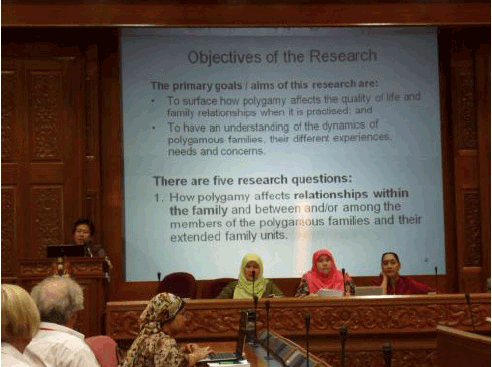 by Jessica de Cruz, intern at SIS – Malaysia
by Jessica de Cruz, intern at SIS – Malaysia
The status of women‟s rights in Islam is a highly contentious issue with profound impact on Malaysia‟s Muslim majority population. CSBR member organization, Malaysian-based women‟s rights NGO Sisters in Islam (SIS) argues that Malaysia‟s 1984 Islamic Family Law Act (IFL), to which all Malaysian Muslims are subject, is restrictive of women‟s rights and has become more so in recent years. One key area of debate is polygamy, the impact of which has been comprehensively studied by SIS over the last three years. Researchers from Universiti Kebangsaan Malaysia, Universiti Malaya and Universiti Sains Malaysia led by SIS, interviewed and surveyed numerous husbands, first and second wives in polygamous marriages across Malaysia. Their experiences in a broad range of issues, from financial security to emotional impact, from social relationships to sexual needs were examined. This article is based upon SIS‟ research findings from the East and Central Zones, as presented at the 7th Malaysian Studies Conference in March 2010.
In Malaysia, Muslim men can legally take up to four wives. In 1994, to the consternation of women‟s rights groups, the IFL was amended allowing men to contract polygamous marriages without prior permission from a Syariah court, provided that they subsequently obtain legal endorsement. To avoid lengthy annulment proceedings courts tend to endorse such marriages, failing to thoroughly examine the impact on existing wives. Whilst in most states, Muslim family law stipulates that existing wives must be informed of their husbands‟ application for polygamous marriage, many men circumvent this requirement by taking an additional wife in a different state. Without a centralised registration database that records all Muslim marriages, women struggle to ascertain that their husband has taken an additional wife. Women who are aware of their husband‟s intention to marry another are occasionally permitted to voice their opinion in court, but the court is not obligated to consider their consent or opposition. Thus, many polygamous marriages are contracted without the existing wives‟ approval or knowledge.
The emotional distress caused by such polygamous marriages is exacerbated by the financial repercussions. Whilst the Qur’an and IFL stipulate that a man may enter a polygamous marriage only if he can provide equally in material as well as intangible needs, the rule is poorly enforced. In Perak, for instance, a man is not required to prove his financial means, but must merely state his intention to treat his wives fairly. Financial problems are felt acutely by first wives, with 40% stating that their husband‟s financial contribution to the first family diminished significantly after these men‟s second marriages. Second wives generally reported feeling more financially secure than first wives, it is posited that this may be due to their lower expectations of their husbands‟ obligations towards them.
Amendments to the IFL have been regressive in ensuring that first wives‟ attain financial security: husbands are no longer required to maintain their first wives‟ standard of living, and first wives are often forced to surrender their right to maintenance if they seek to obtain „harta sepencarian.‟(1) Consequently many first wives are compelled to increase their working hours to support their children. Children are profoundly affected as many resent their absent fathers, particularly when denied their right to proper education owing to their fathers‟ financial neglect. Within the existing IFL there is little a woman can do to escape the deleterious effects of a polygamous marriage, she even loses her entitlement to maintenance if she leaves the marital home without her husband‟s approval and is declared nusyuz (2) by the Syariah court. It is unsurprising that 82.8% of first wives stayed in a polygamous marriage merely for the sake of their children.
It is apparent that many polygamous marriages in Malaysia fail to live up to the Qur’anic image of a humane institution designed to protect women and children in the exceptional circumstance of a post-war period. The 2005 amendment to the IFL no longer requires that a polygamous marriage be proven „both just and necessary‟; only „just or necessary‟ thus allowing the notion of justice, the raison d’etre of polygamy in the Qur’an, to be almost completely undermined or disregarded in court deliberations. SIS intends to use the research findings to lobby the Malaysian government to amend the IFL to ensure that polygamous marriages uphold justice and equality for all concerned. In 2011, SIS will publish its research findings in academic and other publications, to increase public awareness on the negative impact of polygamy. SIS also hopes to garner popular support for more effective legal protection for all the members of polygamous marriages. Progressive amendments to the IFL will be most effective when supported by a civil society movement that challenges the discourses of superiority and patriarchy upon which many polygamous marriages are based. Hence, SIS‟ research is an important contribution towards advocating for women‟s rights in Malaysia and striving for advancements in this particular area.
(1) Division of matrimonial property.
(2) Disobedient

